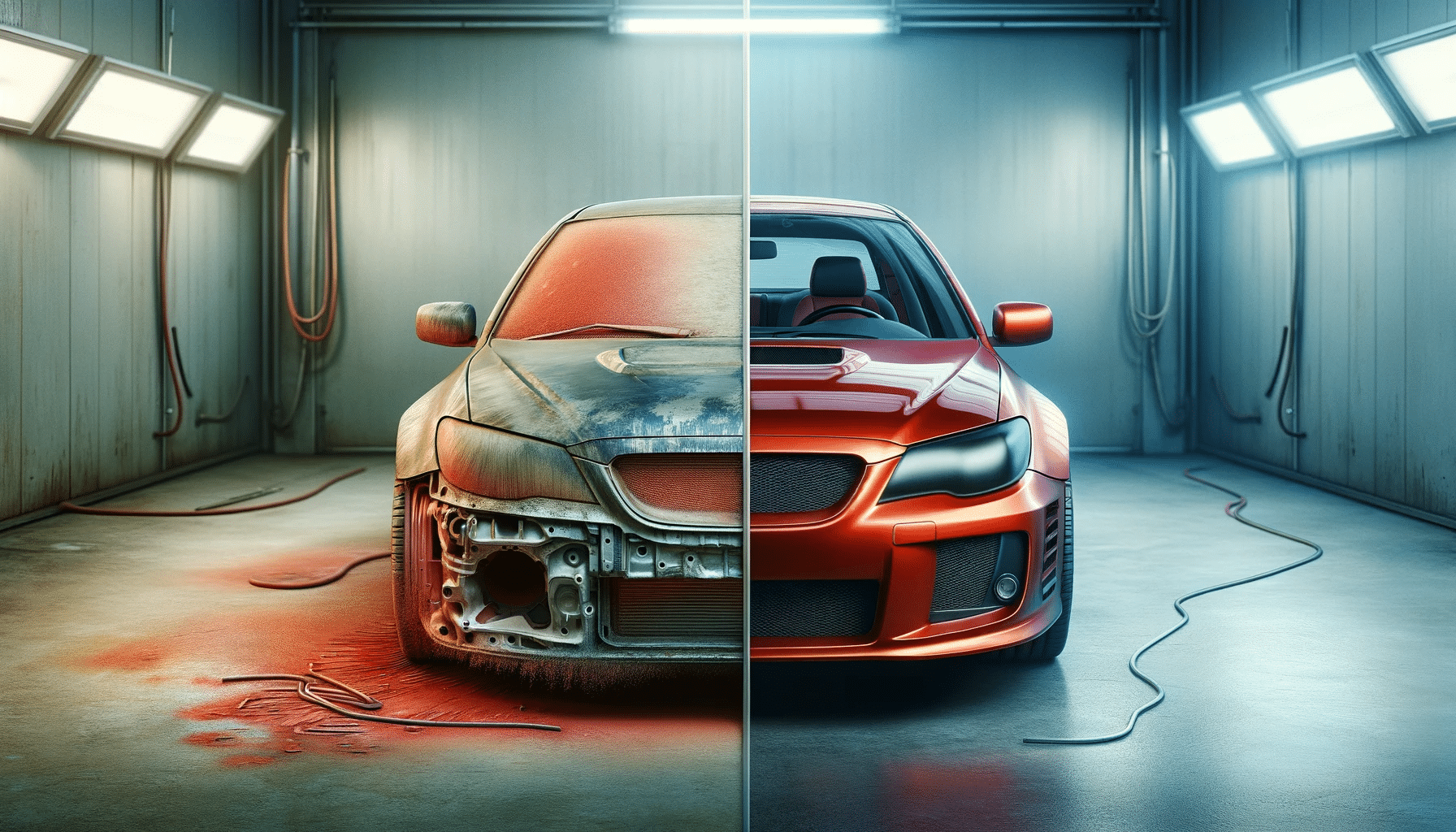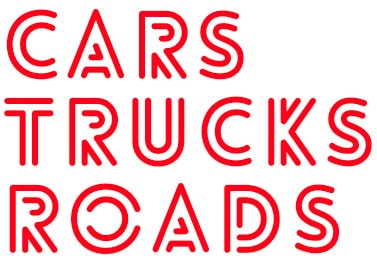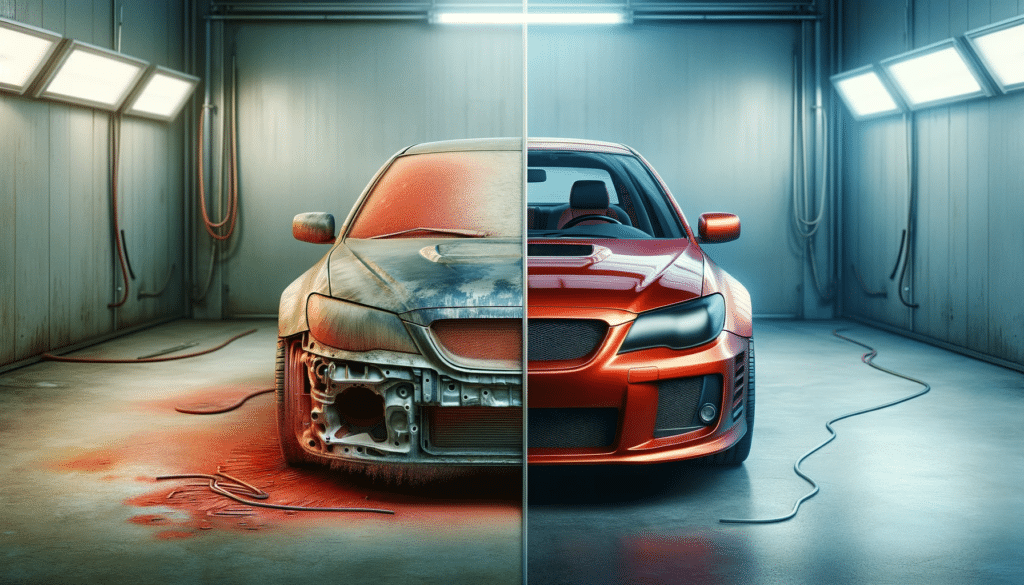
When considering how much does it cost to paint a car, there are several important factors to take into account. The price can vary greatly depending on the size and condition of your car, the quality of paint you choose, the amount of preparation required, and the reputation of the shop doing the work. With costs ranging from $500 for a basic single-stage paint job to over $5,000 for a high-end multi-stage application with extensive bodywork, it pays to understand what goes into determining the expense.
This article will break down the typical price ranges for different levels of paint jobs, signs that a new paint job is needed, and considerations for choosing between a professional service versus a DIY approach. Whether you’re looking to increase your car’s aesthetic appeal, protect it from rust, personalize it, or repair existing damage, understanding the estimated cost to paint a car will help you budget and set expectations for this major detailing investment.
Cost to Paint a Car: Detailed Overview
| Factors | Description | Price Ranges | Additional Info |
|---|---|---|---|
| Size of the car | Larger cars will require more paint and labor, increasing the overall cost. | Varies with size | Compact: $, Sedan: $$, SUV: $$$, Truck: $$$$ |
| Type and quality of paint | High-quality paints and specialty finishes will be more expensive than standard options. | Basic: $500 – $3,000 High-quality: >$5,000 |
Specialty finishes include metallic, pearlescent, and custom designs. |
| Amount of prep work | Extensive bodywork, sanding, or rust removal before painting increases labor costs. | Basic: Minimal Extensive: >$5,000 |
Prep work can also include minor dent repair or replacing certain car parts. |
| Paint shop reputation and location | Well-established shops may charge more. Costs also vary by local market. | Varies by shop | Higher costs in urban areas and with shops that have a high-end clientele. |
| DIY paint job | A DIY approach might save costs but vary in quality and durability. | $250 – $1,500 | Requires significant time and effort, and results may not be professional. |
Car Painting Opportunities: New vs. Old Cars
| Car Age | Benefits | Considerations | Typical Cost Range |
|---|---|---|---|
| New Car (Less than 3 years, Low Mileage) |
|
|
$$ – $$$ |
| Older Car (10+ years, High Mileage) |
|
|
$ – $$$$ |
How Much Does It Cost To Paint A Car? General Breakdown
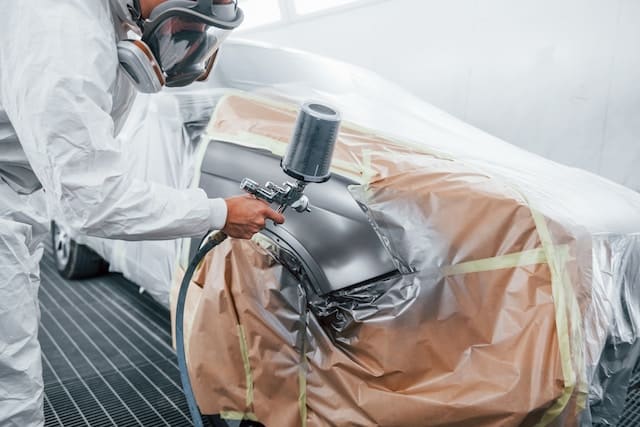
From Basic To Extensive Work
The cost of painting a car can vary significantly depending on several factors, including:
Size of the car
Larger cars will require more paint and labor, increasing the overall cost.
Type and quality of paint
High-quality paints and specialty finishes, such as metallic or pearl, will be more expensive than standard paint options.
Amount of prep work
If your car requires extensive bodywork, sanding, or rust removal before painting, the labor costs will increase.
Paint shop reputation and location
Well-established paint shops with a reputation for quality work may charge more for their services. Additionally, labor costs can vary depending on the local market.
Considering these factors, painting a car can range from around $500 to $5,000 or more. For a basic, single-color paint job with minimal prep work, you might expect to pay $500 to $3,000. If you opt for a higher-quality paint, custom finishes, or extensive prep work, the cost can easily exceed $5,000.
It’s essential to obtain multiple quotes from different paint shops to get a better understanding of the costs involved in your specific case. Make sure to ask about the materials and processes they use to ensure you are getting a high-quality paint job that meets your expectations.
The Cost of Car Painting: Price Ranges
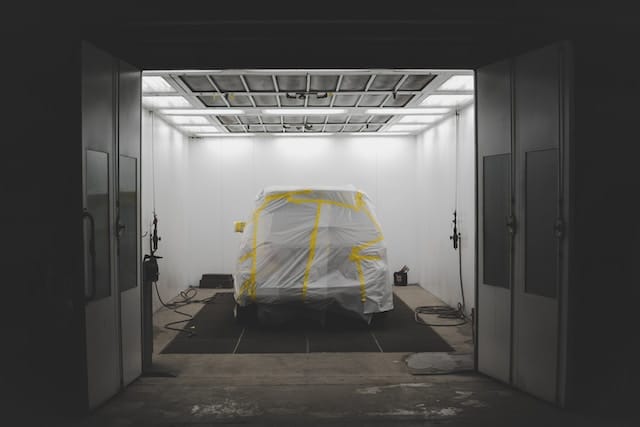
The cost of a paint job can vary significantly depending on the level of quality, materials used, and the amount of labor involved. Here’s a general breakdown of the price ranges for different levels of paint jobs and DIY:
Basic paint job: ($500 – $2,000)
A basic paint job typically involves a single-stage enamel paint and minimal prep work. This option is the most affordable but may not offer the same level of durability, gloss, or color depth as higher-quality paint jobs. It’s best suited for older vehicles or those with a limited budget.
Standard paint job: ($1,500 – $4,000)
A standard paint job usually includes a higher-quality base coat and clear coat, along with more thorough prep work. This option provides better durability and appearance than a basic paint job, with a higher level of gloss and color depth. Standard paint jobs are suitable for most vehicles and owners looking for a balance between cost and quality.
Expert paint job: ($3,500 – $10,000+)
An expert paint job involves the use of premium paint, a multi-stage process (base coat, mid coat, and clear coat), and extensive prep work, including sanding, priming, and any necessary bodywork repairs. This option offers the highest level of durability, gloss, and color depth, and is ideal for luxury vehicles, classic cars, or those seeking the best possible finish.
DIY paint job: ($250 – $1,500)
The cost of a DIY paint job can vary widely depending on the materials used and the equipment required. A DIY paint job might involve using spray cans or a low-cost paint sprayer, and the quality of the result can be inconsistent. This option is best for those with experience in painting vehicles and access to the necessary tools. Keep in mind that the final appearance and durability may not be comparable to a professional paint job.
Please note that these price ranges are approximate and may vary depending on factors such as location, the size and condition of the car, and the specific paint shop or materials chosen. It’s always a good idea to obtain multiple quotes from different paint shops to get a more accurate estimate of the cost for your specific situation.
Why Should You Paint Your Car?
Painting your car can be a good idea for several reasons:
Aesthetic appeal
A new paint job can dramatically improve the appearance of your car, giving it a fresh, updated look. You can choose a color that reflects your personal style or opt for a custom design to make your car stand out.
Increased resale value
A well-maintained and visually appealing car can command a higher resale value. A professional paint job can help remove minor scratches, dings, or fading that might lower the perceived value of the vehicle.
Rust prevention
Over time, the paint on a car can become chipped, scratched, or worn, leaving the metal body exposed to the elements. Painting your car provides a protective barrier against rust and corrosion, helping to extend the life of the vehicle.
Personalization
Painting your car allows you to customize it to your preferences, whether you want to match it to your business branding or simply choose a unique color or design that expresses your personality.
Repairing damage
If your car has been involved in an accident or suffered damage from harsh weather, a new paint job can help repair and restore the vehicle to its original condition.
UV protection
Automotive paint typically includes UV-resistant additives that protect the underlying materials from sun damage. A fresh coat of paint can help prevent fading, cracking, and other UV-related damage to your car’s exterior.
Why You Shouldn’t Paint a Car to Paint Over Problems
When considering repainting a vehicle, it’s essential to address any underlying issues first rather than just using paint as a cover-up. Here’s why painting over problems is a bad idea:
- Temporary Fix: Painting over rust, dents, or scratches is merely a cosmetic fix. The underlying issue remains and can continue to worsen over time. For instance, rust can continue to spread beneath the new paint, compromising the car’s structural integrity.
- Paint Adhesion Issues: If there’s rust or an uneven surface because of dents or scratches, the new paint may not adhere properly. This can lead to peeling, flaking, or blistering of the paint over time.
- Resale Value: Painting over unresolved issues can reduce the car’s resale value. A knowledgeable buyer or mechanic can easily spot a cover-up job, which may raise concerns about the car’s maintenance and overall condition.
- Cost Inefficiency: In the long run, painting over a problem can be more expensive. When the issue resurfaces, you’ll likely have to strip the paint, fix the problem, and then repaint, incurring more costs than if you’d addressed the issue initially.
- Aesthetic Concerns: Painting over dents or scratches without fixing them can result in a less than smooth finish. The imperfections might still be noticeable, especially under certain lighting conditions or angles.
- Potential for Further Damage: By ignoring underlying issues and painting over them, you risk further complications. For instance, what starts as a small rust spot can grow into a significant corrosion problem if not addressed.
In summary, while it might be tempting to use a fresh coat of paint as a quick fix, it’s always advisable to address and rectify underlying issues before repainting. This approach ensures the longevity of the paint job and the overall health of the vehicle.
Still, painting your car can be a worthwhile investment in terms of aesthetics, resale value, and vehicle longevity.
The Cost of Car Painting: Choosing Between Professional Services and DIY Option
When deciding whether to choose a professional service or take the DIY route for painting your car, consider the following factors:
Quality and durability
Professional paint shops have access to high-quality paints, equipment, and skilled technicians, ensuring a long-lasting and visually appealing paint job. DIY paint jobs, especially for inexperienced individuals, may result in a lower-quality finish that doesn’t last as long.
Time investment
Painting a car can be a time-consuming process, particularly when it comes to prep work, such as sanding, priming, and masking. A professional service will handle all these steps, allowing you to save time and effort.
Cost
While a professional paint job may be more expensive upfront, the long-term value and quality it provides may outweigh the costs. A DIY paint job may save money initially, but if the result is of lower quality or doesn’t last as long, you may end up spending more on repairs or repainting in the future.
Skill level and experience
If you have experience painting vehicles and access to the necessary equipment, a DIY paint job may be a viable option. However, if you lack experience or don’t have the proper tools, the learning curve can be steep, and the risk of mistakes increases.
Warranty and customer support
Professional paint shops often provide warranties or guarantees for their work, giving you peace of mind and recourse in case of issues. DIY paint jobs do not offer this level of assurance or support.
In conclusion, choosing between a professional service and a DIY paint job for your car depends on your skill level, experience, budget, and the desired quality and longevity of the paint job. In most cases, opting for a professional service is recommended to ensure a high-quality, durable finish that protects and enhances the appearance of your car.
How Much Does It Cost To Paint A Car: Signs It’s Time for a New Paint Job
Discoloration
A telltale sign that your car needs a new paint job is when the paint starts to fade. Fading is common if the vehicle isn’t regularly washed and polished, causing the color to lose its vibrancy over time.
Peeling
If the paint begins to flake off the car’s surface, it’s a clear indication that a new paint job is necessary. The clear coat can weaken and detach from the underlying paint layer due to factors such as age and exposure to extreme temperatures.
Scratches
Minor scratches can often be addressed with touch-up paint. However, for more extensive or deep scratches, a complete repaint of the exterior may be required to restore the car’s appearance.
Estimating the Cost of Repairing Sun Damage on a Vehicle
The cost to fix sun damage on a car can vary widely based on several factors, such as the extent of the damage, the type of car, the quality of repair materials, and the labor rates in your area. Here are some common repairs related to sun damage and a general cost range for each:
- Paint Correction: For minor sun damage that has not yet penetrated the clear coat, a paint correction process which includes buffing and polishing might suffice. This can cost anywhere from $100 to $500 depending on the size of the area and the rates of the service provider.
- Partial Repaint: If the sun damage has caused the paint to fade significantly, but the damage is localized to certain areas (like the hood, roof, or trunk), you might be able to get away with a partial repaint. This could run from $250 to over $1,000.
- Full Body Paint Job: In cases where the damage is extensive across the entire vehicle, a full body paint job might be necessary. This is the most expensive option and can range from $1,000 to $5,000 or more for high-quality work.
- Clear Coat Repair: When the clear coat is peeling or showing signs of oxidation but the underlying paint is still intact, you might only need clear coat repair. This can cost $500 to $1,500.
- Additional Treatments: Sometimes, the car may require additional treatments like sealing or waxing after the paint job to protect the new paint from further damage. This could add an additional $100 to $200 to the total cost.
FAQs: Understanding the Costs and Factors of Painting a Car
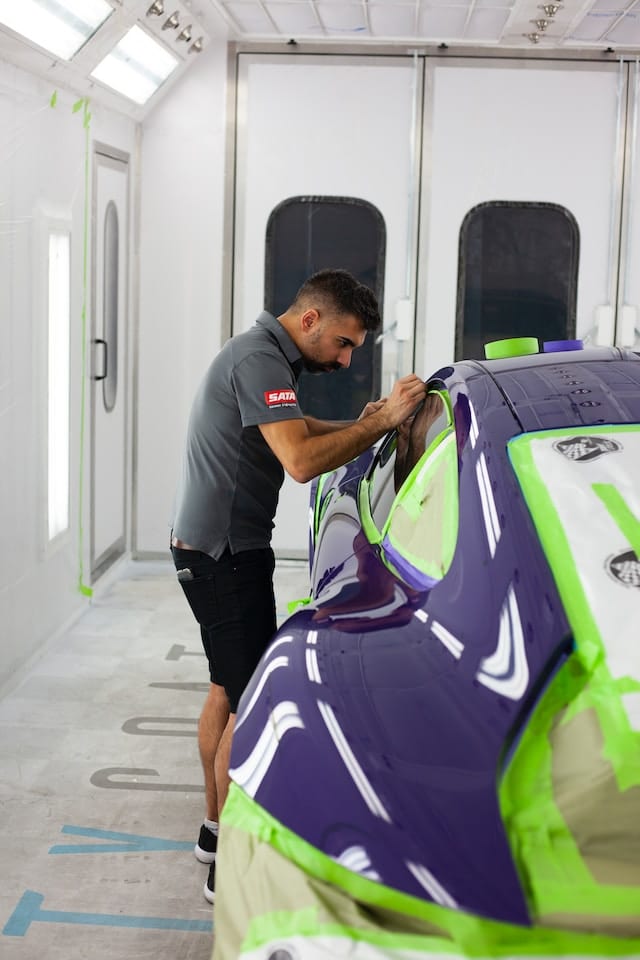
Q: How much can it cost to paint a car?
The cost can range from $500 to $5,000 or more, depending on several factors like the size of the car, type of paint, prep work, and the shop’s reputation.
Q: How do the size and type of my car affect the cost?
Larger cars need more paint and labor, which generally increases the overall cost.
Q: Is it more expensive to paint a truck than a car?
Generally, yes. Trucks are often larger than cars, requiring more paint and labor. The complexity of trucks, such as additional sections or surfaces, might also contribute to higher costs. However, the final price can vary based on the quality of the paint job, the specific vehicle models in question, and regional price differences. It’s important to note that this isn’t always the case. Depending on the type of car and the specific paint job requested, a car can sometimes cost as much, if not more, than painting a truck. Always get quotes from multiple service providers to compare costs effectively.
Q: What role does the type and quality of paint play?
High-quality paints and special finishes, such as metallic or pearl, tend to be more expensive.
Q: Does preparatory work impact the cost?
Yes, if your car needs extensive bodywork, sanding, or rust removal before painting, labor costs will be higher.
Q: Does the location and reputation of the paint shop matter?
Well-known paint shops may charge more for their quality services, and labor costs can also vary depending on the local market.
Q: What are the benefits of painting my car?
It can increase the car’s aesthetic appeal, resale value, and provide protection against rust. It also allows for personalization and can repair existing damage.
Q: Should I go for a professional service or opt for a DIY paint job?
Professional services offer better quality and durability but may be more expensive. DIY is less expensive but may lack in quality, especially if you’re inexperienced.
Q: What are the signs that my car needs a new paint job?
Common signs include paint discoloration, peeling, and extensive scratches that can’t be addressed with touch-up paint.
Q: What should I consider before deciding to go for a paint job for my car?
Consider the current condition of your car’s paint, your budget, and the type of finish you want. Also, think about how long you plan to keep the car, as a higher-quality paint job may be a better investment in the long term.
Q: How can I make sure the new paint job fits my personality?
To ensure the new color or design reflects your personality, spend some time looking at color charts and consider custom finishes. Some paint shops even offer digital previews of how the colors will look on your car.
Q: What are the benefits of painting my car?
Painting your car increases its aesthetic appeal, resale value, and provides protection against rust. It also allows for personalization and can repair existing damage.
